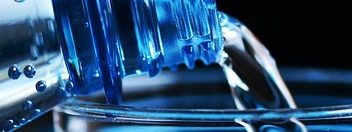You have heard:
- Drink eight 8 oz glasses of water a day.
- Every day drink – in ounces – half your body weight in pounds.
- Drink as much as you can when you are exercising.
- Your thirst sense cannot be trusted, so you must drink before you are thirsty.
None of these have any evidence behind them!
In fact, in certain cases it has lead to death.
Our body is from 60 – 90% water, depending on the tissue. The fact is that our desert climate is dehydrating. Also, we lose water through sweat.
Yes, we do need to drink water.
The question is, how much? Can we trust our thirst?
This HAS been studied, and they did not come up with the conclusions listed above.
The Physiology of Dehydration
When our total body water is reduced, we technically are in the state of dehydration.
The brain detects dehydration through noticing the blood concentration of solutes, which are particles such as sodium dissolved in it. When we sweat or lose water unnaturally through diarrhea, the concentration of water goes down so the concentration of those solutes in the blood increases.
A part of the brain called the hypothalamus samples blood to see the concentration of solutes. When it is higher than its known standard, then those solutes stimulate a receptor in the hypothalamus, triggering a series of nerve signals in the brain. The resulting two signals do two different things.
The first signal is to increase the secretion of a hormone called arginine vasopressin, or AVP. This hormone signals the kidneys to increase water reabsorption and reduce the amount of water which is passed through. This results in less urine released to the urinary bladder, thereby retaining more body total body water.
The second signal in the brain increases the sensation of thirst. When we drink, the water gets absorbed and the kidneys retain it. Through the action of another hormone, aldosterone, sodium is reabsorbed by the kidneys.
The end result is that the concentration of solutes in the blood returns to its homeostatic normal amount, switching off the thirst signal.
The first symptom of dehydration is thirst.
Symptoms of not drinking enough water
A study was done in the Nevada desert at the beginning of World War II in which people drank less water than their thirst sensation dictated. Of interest is the fact that the subjects in the study were denied water until the activity in the study was done. The brain can respond to the anticipation of what will happen in the future. Some of the results may have been skewed due to this.
The study question was:
How far and for how long can military personnel walk in desert heat before they become incapacitated when they either did or did not ingest fluids?
The subjects experienced:
- Initially: thirst, and it continued the whole time until they got water
- vague discomfort: skin flushing, heat oppression, weariness, sleepiness, impatience, dizziness, anorexia
- when walking pace cannot be maintained: shortness of breath, tingling, blueness of skin, spasms
- later: impaired coordination, fainting
All these symptoms reversed themselves upon drinking water and lying down.
Can we trust thirst?
Thirst is mechanism to self-correct when the total body water has decreased. It is a biological signal so that healthy people do not lose enough water to cause illness.
As explained in the dehydration section, the thirst mechanism is triggered when the blood loses water and the solute concentration goes higher than the set point. When the solute concentration has hit its target again, the thirst mechanism is quenched.
While stress can damage the hypothalamus, the brain center regulating thirst, it is possible that the thirst mechanism can get blunted. However, by paying attention to the thirst signal and drinking when thirsty, homeostasis can be maintained.
What about when exercising?
We sweat when we exert ourselves physically. With endurance exercise, we can lose a significant amount of body weight which is water.
We are such beautifully designed beings that even when we lose water weight, we can maintain our blood solute concentration. One study amongst many on the subject concluded:
Plasma volume and serum [Na] were maintained in male Ironman triathletes, despite significant (5%) body weight loss during the course of the race. Body weight was not an accurate “absolute” surrogate of fluid balance homeostasis during prolonged endurance exercise.
This means that if you sweat out a lot of water and do not replace it right away, you are fine as long as you drink water when you are done with the endurance exercise.
Other studies showed there is very little correlation of loss of body water with heat illness and collapse.
How much water is TOO much?
In an article on Water Intoxication, three cases of deaths were reported that occurred in the military from drinking too much water in a short time. They state:
The dangers of drinking too much water (>1-1.5 quarts per hour) in attempts to prevent exertional heat illness must be made known to all.
There were a string of collapse and deaths from athletes drinking too much water as documented in the book Waterlogged, by Tim Noakes, MD. This was because the guidelines were changed in the 1970’s saying to drink as much water as possible.
The blood tests have shown that the solute concentration got too low from drinking too much water too fast. The body could not adapt fast enough.
What will you do?
Do you need to change your thinking and habits about drinking water?
Perhaps you have not been drinking to slake your thirst, ignoring the signal.
Perhaps you have been drinking water before you get thirsty.
Either way, now you know that you can trust your thirst. Go ahead and drink when you are thirsty and don’t force things.
What are your new water drinking habits?




